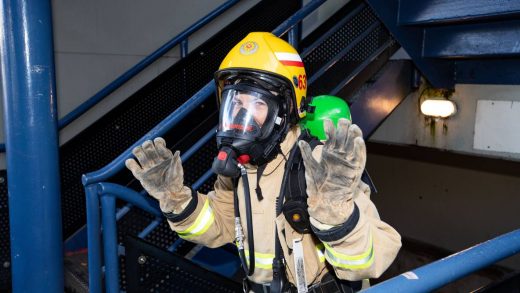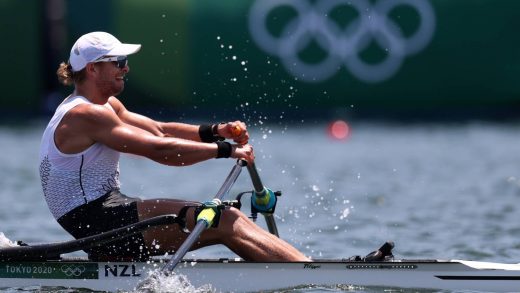
Robyn Edie/Stuff
Watched by her assistance dog Paddy and coach Steve Bale, Elizabeth Gasson competes in women’s para cycling at Cycling New Zealand’s Track National Championships at the Invercargill velodrome on Friday.
Elizabeth Gasson was unconscious in hospital at the start of this week.
On Thursday she was competing at Cycling New Zealand’s Track National Championships at the Invercargill velodrome and won her first title.
Gasson’s hospital stay was related to multiple sclerosis, a disease of the central nervous system the 44-year-old was diagnosed with nearly 20 years ago.
But a high dose of antibiotics and a further dose of determination enabled her to compete in the C1-5 para cycling category at the nationals, in the 3000m individual pursuit and 500m time trial.
READ MORE:
* Book extract: Assist Dogs and Their People tells tales of courage, heroism, and love
* National records fall at Southland Track Cycling Championships
* Tokyo Paralympics recap – No medals for New Zealand on day one
She was the sole female in both events, finishing just 0.1 seconds outside her personal best in the 500m and winning her first national title.
“To be able to compete at all at the moment is pretty massive,” she said.
Her body was struggling as she suffered from muscle spasms and contractions, cramping and numbness in her hands and feet.
“It’s permanent.”
Robyn Edie/Stuff
Elizabeth Gasson competes at the Track National Championships at the SIT Zero Fees Velodrome in Invercargill.
A former competitive runner, until multiple sclerosis put paid to that, she began cycling in 2019 – at a time when she was feeling down and wanted a boost.
Fellow Wellingtonian Steve Bale became her coach, and they both remember her first training session at a concrete outdoor velodrome in Wellington.
At the time, she was in and out of a wheelchair, and it was painful to ride a bike.
“I think I survived three seconds and fell off,” Gasson said.
“And then she fell off again, and again, and broke her fingers, and broke her wrist, then she kept on going anyway,” Bale added. “She wouldn’t stop.”
Robyn Edie/Stuff
Elizabeth Gasson gets some love from her assistance dog Paddy after an event at the Track National Championships at the velodrome in Invercargill. The competition ends on Sunday.
Bale gave her the option of pulling out, but she wanted to see how far she could go with the sport.
Bale said the key to success in para cycling was having tenacity and perseverance, and Gasson had plenty of both.
Multiple sclerosis had weakened her muscles and diminished her balance, depth perception and vision.
Though it was getting progressively worse each year, she said she was “fighting back” by continually adapting her bike to make it more comfortable to ride, while the training was beneficial for her cardiovascular levels and muscle strength.
Her goal of competing at the paralympics remained strong.
As part of that goal the duo are headed to Europe and the US next month, to compete in the road racing world cup for para cycling, with fundraising a big focus ahead of the trip.
Gasson, whose assistance dog Paddy helps with her mobility issues, said multiple sclerosis had high rates of suicide, and she hoped her story would inspire at least one person with the illness.
“Just go out there and live.”


